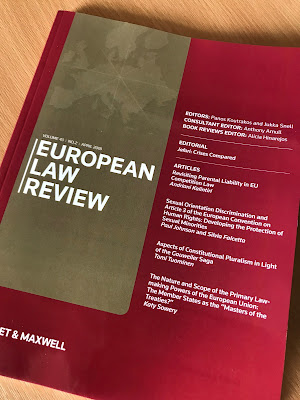New academic publication on Article 3 ECHR and sexual orientation discrimination
We are very delighted to announce that the European Law Review has published in their
latest issue our article on the utility of Article 3 of the European Convention on Human
Rights for addressing discrimination on the grounds of sexual orientation.
In this article we provide a critical analysis of the history and evolution of the Court’s Article
3 jurisprudence in order to assess the ways in which this has developed the protection of
sexual minorities in Europe.
A key focus of our research is on how sexual minorities might better and more creatively use
Article 3 of the Convention in the future to address discrimination against them.
One area of discrimination we focus on specifically is in respect of marriage and our proposition is that the damage to human dignity created by exclusion from marriage can be argued to amount to degrading treatment within the meaning of Article 3 of the Convention.
Here is the abstract of our article:
In 2012, the European Court of Human Rights held, for the first time, that the discriminatory
treatment of an individual on the grounds of his sexual orientation amounted to a violation
of art.3, alone and in conjunction with art.14, of the European Convention on Human Rights.
This judgment is highly significant given that individuals in Europe have been arguing since
1959 that forms of ill-treatment based on sexual orientation amount to a violation of art.3
of the Convention. In this article we provide a critical analysis of the evolution of the
Court’s art.3 jurisprudence in order to assess the ways in which this has developed the
protection of sexual minorities in Europe. We identify major gaps in this protection, most
notably in respect of asylum, and argue that the Court’s art.3 jurisprudence should be
further evolved to address these. Using the example of same-sex marriage, we conclude
with a consideration of how sexual minorities might better and more creatively use art.3 in
the future to address discrimination against them.

Comments
Post a Comment